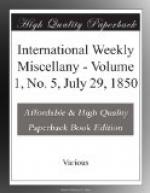* * * * *
Anecdote of Mathews.—One morning, after stopping all night at this pleasant house, I was getting up to breakfast, when I heard the noise of a little boy having his face washed. Our host was a merry bachelor, and to the rosiness of a priest might, for aught I knew, have added the paternity; but I had never heard of it, and still less expected to find a child in his house. More obvious and obstreperous proofs, however, of the existence of a boy with a dirty face, could not have been met with. You heard the child crying and objecting; then the woman remonstrating; then the cries of the child snubbed and swallowed up in the hard towel; and at intervals out came his voice bubbling and deploring, and was again swallowed up. At breakfast, the child being pitied, I ventured to speak about it, and was laughing and sympathizing in perfect good faith, when Mathews came in, and I found that the little urchin was he.
* * * * *
Shelley’s generosity.—As an instance of Shelley’s extraordinary generosity, a friend of his, a man of letters, enjoyed from him at that period a pension of a hundred a year, though he had but a thousand of his own; and he continued to enjoy it till fortune rendered it superfluous. But the princeliness of his disposition was seen most in his behavior to another friend, the writer of this memoir, who is proud to relate that, with money raised with an effort, Shelley once made him a present of fourteen hundred pounds, to extricate him from debt. I was not extricated, for I had not yet learned to be careful; but the shame of not being so, after such generosity, and the pain which my friend afterward underwent when I was in trouble and he was helpless, were the first causes of my thinking of money matters to any purpose. His last sixpence was ever at my service, had I chosen to share it. In a poetical epistle written some years after, and published in the volume of “Posthumous Poems,” Shelley, in alluding to his friend’s circumstances, which for the second time were then straitened, only made an affectionate lamentation that he himself was poor; never once hinting that he had himself drained his purse for his friend.




